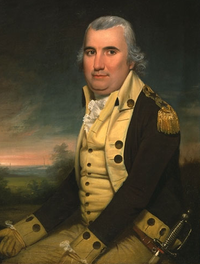Charles Cotesworth Pinckney
| Charles Cotesworth Pinckney | |
|---|---|
 |
|
| United States Minister to France | |
|
In office September 9, 1796 – February 5, 1797 |
|
| President | George Washington |
| Preceded by | James Monroe |
| Succeeded by | Robert Livingston |
| Personal details | |
| Born |
February 25, 1746 Charleston, Province of South Carolina |
| Died | August 16, 1825 (aged 79) Charleston, South Carolina |
| Political party | Federalist Party |
| Spouse(s) | Sarah Middleton Mary Stead |
| Children | 3 |
| Alma mater | Christ Church, Oxford |
| Occupation | Lawyer, planter, statesman, soldier |
| Religion | Episcopalian |
Charles Cotesworth "C. C." Pinckney (February 25, 1746 – August 16, 1825) was an early American statesman of South Carolina, Revolutionary War veteran, and delegate to the Constitutional Convention. He was twice nominated by the Federalist Party as its presidential candidate in 1804 and 1808, losing both elections.
Charles Cotesworth Pinckney was born into the Pinckney family of aristocratic planters in Charleston, South Carolina, on February 25, 1746. He was the son of Charles Pinckney, who would later serve as the chief justice of the Province of South Carolina, and the celebrated planter and agriculturalist, Eliza Lucas. He was the elder brother of Thomas Pinckney, who served as Governor of South Carolina, as a U.S. Representative, and as a George Washington administration diplomat. His first cousin once removed, Charles Pinckney, served as Governor of South Carolina, as a U.S. Senator, and as a diplomat in the administration of Thomas Jefferson.
In 1753, Pinckney's father moved the family to London, England, where he served as the colony's agent (essentially as a lobbyist to protect South Carolina's commercial and political interests). Both Charles and his brother Thomas were enrolled in the Westminster School, where they remained after the rest of the family returned to South Carolina in 1758. Both brothers also studied at Oxford University. Pinckney matriculated from Christ Church, Oxford in 1764, and left to study law at the Middle Temple in 1766. Pinckney was called to the bar in 1769, but he continued his education in France for another year, studying botany and chemistry. He also had a brief stint at the Royal Military College at Caen.
...
Wikipedia
